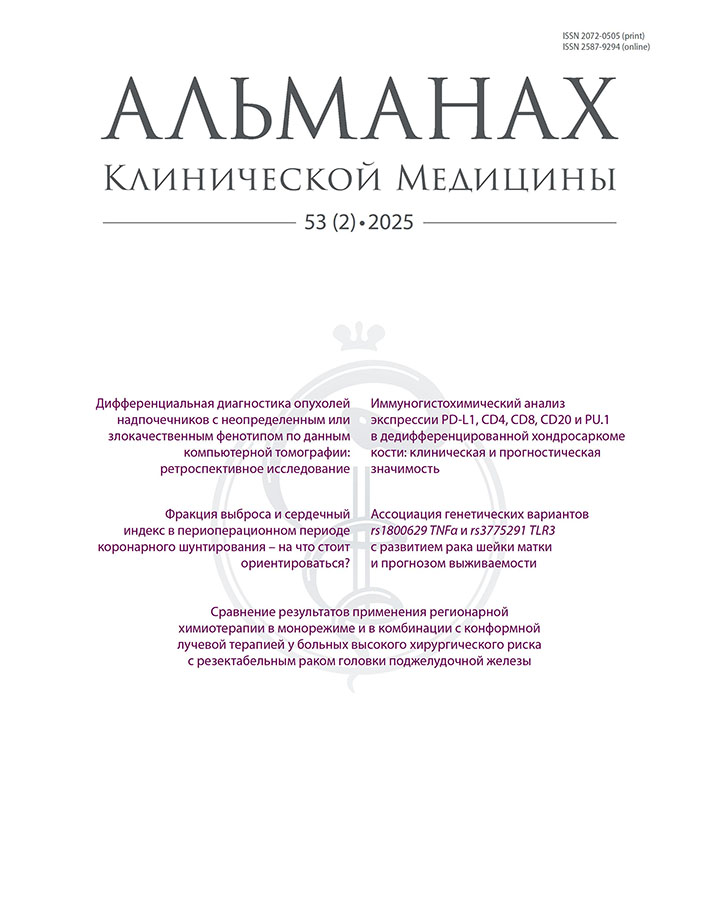РОЛЬ НУТРИГЕНОМИКИ В КОРРЕКЦИИ МЕТАБОЛИЧЕСКИХ НАРУШЕНИЙ
- Авторы: Мисникова И.В.1
-
Учреждения:
- Московский областной научно-исследовательский клинический институт им. М.Ф. Владимирского
- Выпуск: 2015: Спецвыпуск 1
- Страницы: 42-45
- Раздел: ПРОБЛЕМЫ ОЖИРЕНИЯ
- URL: https://almclinmed.ru/jour/article/view/66
- DOI: https://doi.org/10.18786/2072-0505-2015-1-42-45
- ID: 66
Цитировать
Полный текст
Аннотация
У некоторых пациентов диета и расширение физической активности оказываются недостаточно эффективными мерами в отношении предотвращения развития сахарного диабета 2-го типа. Сегодня предлагается новый подход к построению диеты с учетом индивидуальных особенностей человека. Компоненты пищи могут вызывать изменения в метаболизме через воздействие на активность определенных генов, которые, в свою очередь, влияют на протеом и метаболом человека. Предполагается, что нутриенты могут влиять на процессы метилирования дезоксирибонуклеиновой кислоты. В ряде исследований установлено взаимодействие между генами, ассоциированными с ожирением и сахарным диабетом 2-го типа, и некоторыми пищевыми продуктами. Разработаны рекомендации по питанию исходя из наличия тех или иных полиморфизмов генов и определен тот спектр полиморфизмов генов, который необходимо исследовать у лиц с метаболическими нарушениями или с высоким риском их развития.
Об авторах
И. В. Мисникова
Московский областной научно-исследовательский клинический институт им. М.Ф. Владимирского
Автор, ответственный за переписку.
Email: inna-misnikova@mail.ru
Мисникова Инна Владимировна – доктор медицинских наук, вед. научный сотрудник отделения терапевтической эндокринологии, профессор кафедры эндокринологии факультета усовершенствования врачей
* 129110, г. Москва, ул. Щепкина, 61/2–9, Российская Федерация. Тел.: +7 (495) 688 95 93. E-mail: inna-misnikova@mail.ru
РоссияСписок литературы
- Ross SA. Diet and DNA methylation interactions in cancer prevention. Ann N Y Acad Sci. 2003;983:197–207.
- Milner J, Trujillo EB, Kaefer CM, Ross S. Nutrigenomics. In: Biosocial Surveys. Committee on Advances in Collecting and Utilizing Biological Indicators and Genetic Information in Social Science Surveys. Weinstein M, Vaupel JW, Wachter KW, editors; Committee on Population, Division of Behavioral and Social Sciences and Education. National Research Council. Washington: The National Academies Press; 2008.
- Zhao T, Zhao J, Yang W. Association of the fatty acid-binding protein 2 gene Ala54Thr polymorphism with insulin resistance and blood glucose: a meta-analysis in 13451 subjects. Diabetes Metab Res Rev. 2010;26(5):357–64.
- de Luis D, Aller R, Izaola O, Sagrado MG, de la Fuente B, Conde R, Primo D. Effect of fatty acid-binding protein 2 Ala54Thr genotype on weight loss and cardiovascular risk factors after a high-polyunsaturated fat diet in obese patients. J Investig Med. 2012;60(8):1194–8.
- de Luis DA, Aller R, Izaola O, Gonzalez Sagrado M, Conde R. Fatty acid-binding protein 2 Ala54Thr genotype is associated with insulin resistance and leptin levels changes after a high monounsaturated fat diet in obese non-diabetic patients. J Endocrinol Invest. 2013;36(6):402–6.
- Xu HE, Lambert MH, Montana VG, Parks DJ, Blanchard SG, Brown PJ, Sternbach DD, Lehmann JM, Wisely GB, Willson TM, Kliewer SA, Milburn MV. Molecular recognition of fatty acids by peroxisome proliferator-activated receptors. Mol Cell. 1999;3(3):397–403.
- Vidal-Puig A, Jimenez-Liñan M, Lowell BB, Hamann A, Hu E, Spiegelman B, Flier JS, Moller DE. Regulation of PPAR gamma gene expression by nutrition and obesity in rodents. J Clin Invest. 1996;97(11):2553–61.
- Tönjes A, Scholz M, Loeffler M, Stumvoll M. Association of Pro12Ala polymorphism in peroxisome proliferator-activated receptor gamma with Pre-diabetic phenotypes: meta-analysis of 57 studies on nondiabetic individuals. Diabetes Care. 2006;29(11):2489–97.
- Alsaleh A, O'Dell SD, Frost GS, Griffin BA, Lovegrove JA, Jebb SA, Sanders TA; RISCK Study investigators. Interaction of PPARG Pro12Ala with dietary fat influences plasma lipids in subjects at cardiometabolic risk. J Lipid Res. 2011;52(12):2298–303.
- Baratta M. Leptin – from a signal of adiposity to a hormonal mediator in peripheral tissues. Med Sci Monit. 2002;8(12):RA282–92.
- Панков ЮА. Мутации в ключевых генах, контролирующих развитие ожирения и сахарного диабета. Молекулярная биология. 2013;47(1):38–49. (Pankov YuA. [Mutations of key genes controlling for development of obesity and diabetes mellitus]. Molekulyarnaya biologiya. 2013;47(1):38–49. Russian).
- Mizuta E, Kokubo Y, Yamanaka I, Miyamoto Y, Okayama A, Yoshimasa Y, Tomoike H, Morisaki H, Morisaki T. Leptin gene and leptin receptor gene polymorphisms are associated with sweet preference and obesity. Hypertens Res. 2008;31(6):1069–77.
- Murugesan D, Arunachalam T, Ramamurthy V, Subramanian S. Association of polymorphisms in leptin receptor gene with obesity and type 2 diabetes in the local population of Coimbatore. Indian J Hum Genet. 2010;16(2):72–7.
- Yiannakouris N, Yannakoulia M, Melistas L, Chan JL, Klimis-Zacas D, Mantzoros CS. The Q223R polymorphism of the leptin receptor gene is significantly associated with obesity and predicts a small percentage of body weight and body composition variability. J Clin Endocrinol Metab. 2001;86(9):4434–9.
- Phillips CM, Goumidi L, Bertrais S, Field MR, Ordovas JM, Cupples LA, Defoort C, Lovegrove JA, Drevon CA, Blaak EE, Gibney MJ, Kiec-Wilk B, Karlstrom B, Lopez-Miranda J, McManus R, Hercberg S, Lairon D, Planells R, Roche HM. Leptin receptor polymorphisms interact with polyunsaturated fatty acids to augment risk of insulin resistance and metabolic syndrome in adults. J Nutr. 2010;140(2):238–44.
- Carpenter CL, Wong AM, Li Z, Noble EP, Heber D. Association of dopamine D2 receptor and leptin receptor genes with clinically severe obesity. Obesity (Silver Spring). 2013;21(9):E467–73.
- Steemburgo T, Azevedo MJ, Gross JL, Milagro FI, Campión J, Martínez JA. The rs9939609 polymorphism in the FTO gene is associated with fat and fiber intakes in patients with type 2 diabetes. J Nutrigenet Nutrigenomics. 2013;6(2):97–106.
- Ortega-Azorín C, Sorlí JV, Asensio EM, Coltell O, Martínez-González MÁ, Salas-Salvadó J, Covas MI, Arós F, Lapetra J, Serra-Majem L, Gómez-Gracia E, Fiol M, Sáez-Tormo G, Pintó X, Muñoz MA, Ros E, Ordovás JM, Estruch R, Corella D. Associations of the FTO rs9939609 and the MC4R rs17782313 polymorphisms with type 2 diabetes are modulated by diet, being higher when adherence to the Mediterranean diet pattern is low. Cardiovasc Diabetol. 2012;11:137.
- Barth SW, Koch TC, Watzl B, Dietrich H, Will F, Bub A. Moderate effects of apple juice consumption on obesity-related markers in obese men: impact of diet-gene interaction on body fat content. Eur J Nutr. 2012;51(7):841–50.
Дополнительные файлы








